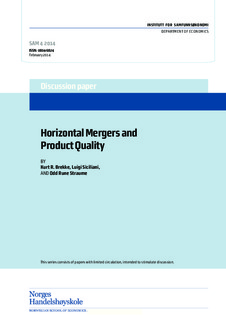| dc.contributor.author | Brekke, Kurt Richard | |
| dc.contributor.author | Siciliani, Luigi | |
| dc.contributor.author | Straume, Odd Rune | |
| dc.date.accessioned | 2014-02-10T08:56:36Z | |
| dc.date.available | 2014-02-10T08:56:36Z | |
| dc.date.issued | 2014-02 | |
| dc.identifier.issn | 0804-6824 | |
| dc.identifier.uri | http://hdl.handle.net/11250/163396 | |
| dc.description.abstract | Using a spatial competition framework with three ex ante identical firms, we study the effects
of a horizontal merger on quality, price and welfare. The merging firms always reduce quality.
They also increase prices if demand responsiveness to quality is sufficiently low. The non-merging
firm, on the other hand, always responds by increasing both quality and prices. Overall, a merger
leads to higher average prices and quality in the market. The welfare implications of a merger are
not clear-cut. If the demand responsiveness to quality is sufficiently high, some consumers benefit
from the merger and social welfare might also increase. | no_NO |
| dc.language.iso | eng | no_NO |
| dc.publisher | Norwegian School of Economics. Department of Economics | no_NO |
| dc.relation.ispartofseries | Discussion paper;4/2014 | |
| dc.subject | horizontal mergers | no_NO |
| dc.subject | quality | no_NO |
| dc.subject | spatial competition | no_NO |
| dc.title | Horizontal mergers and product quality | no_NO |
| dc.type | Working paper | no_NO |
| dc.subject.nsi | VDP::Social science: 200::Economics: 210::Economics: 212 | no_NO |
| dc.subject.jel | L13 | |
| dc.subject.jel | L15 | |
| dc.subject.jel | L41 | |
